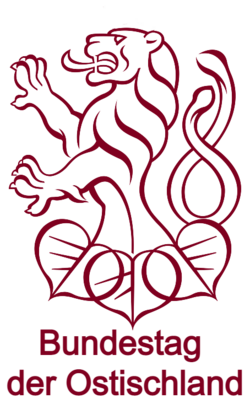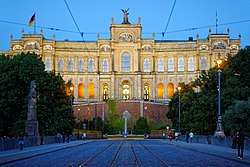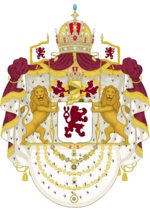Bundestag of Werania
Bundestag of Werania Bundestag der Ostischland | |
|---|---|
 | |
| Type | |
| Type | |
| Houses | House of Councillors House of Deputies |
| Leadership | |
Monarch | Charlotte II since 18 February 1987 |
President of the House of Councillors | |
President of the House of Deputies | |
| Structure | |
| Seats | 232 (House of Councillors) 545 (House of Deputies) |
 | |
House of Councillors political groups | |
 | |
House of Deputies political groups | |
| Elections | |
| FPTP/SNTV | |
House of Councillors last election | 2021 |
House of Deputies last election | 2019 |
House of Councillors next election | 2024 |
House of Deputies next election | 2023 |
| Meeting place | |
 | |
| Palace of Parliament, Westbrücken, Werania | |
The Bundestag of Werania (Weranian: Bundestag der Ostischland; Federal Diet) is the bicameral legislature of the Werania. It consists of an upper house known as the House of Councillors (Ratsmitgliederhaus) and a lower house known as the House of Deputies (Abgeordnetenhaus) whilst the monarch presides over parliamentary proceedings. It retains parliamentary sovereignty over Werania, officially being the representative of the Weranian people. Members of the House of Councillors are referred to as Peers whilst members of the House of Deputies are known as the deputies.
The Bundestag took its current form in 1842 following the unification of Werania, being based on the former Reichstag of the Kingdom of Cislania. The original upper house was named the House of Lords was initially entirely hereditary or appointed by the monarch of Werania whilst members of the House of Deputies were elected in a first-past-the post system. In 1905 the government introduced proportional representation for the House of Deputies. In 1956 the House of Deputies voting system was changed again to a parallel system with a portion of the seats elected through FPTP and a portion through PR. The House of Lords remained unreformed until 1991 when the government aboished it and introduced an entirely elected chamber, the House of Councillors.
Currently 245 members of the House of Deputies are elected through single member districts and 300 through proportional representation whilst whilst all members of the House of Councillors are elected via FPTP and SNTV in multi-member districts with half the members elected every six years to three year terms. The next House of Deputies election is expected in 2023; the next House of Councillors election is in 2024.
